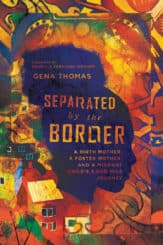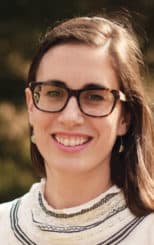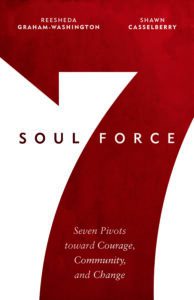An excerpt from Separated by the Border: A Birth Mother, a Foster Mother, and a Migrant Child’s 3,000-Mile Journey

When I walked into the social worker’s office, Julia was sitting there in a brand-new, bright-pink Barbie T-shirt. The social worker said they’d found the T-shirt in their clothing closet, and Julia wanted it. Beautiful, soft onyx curls framed the girl’s umber face. She stood in dirty flip-flops next to the social worker’s chair, chitchatting away in Spanish without a care in the world. “Julia’s been talking my ear off,” the social worker said. “She’s so sweet. But I have no idea what she’s saying.” Another worker brought in a black tote bag with a few other items from the clothing closet, including a pair of sequined high-top sneakers that Julia had picked out.
I began to speak to Julia (pronounced hooleeuh) in Spanish. She seemed happy to hear her mother tongue, but her body didn’t budge. I read that signal loud and clear, so I kept my distance and sat down on the floor.
“Cómo te llamas?” (“What’s your name?”) I asked.
“Julia.”
“Cuántos años tienes?” (“How old are you?”)
“Cuatro.”
She looked older than four to me. I had been told her parents were deported, and she was left behind. She was under federal jurisdiction. I would find out later this was all misinformation.
I signed some papers and said, “We’ll see you all on Monday.”
I asked Julia if she would come to stay with me and my family for the weekend. She smiled. I told her I had three other kids. Her eyes expanded with excitement. On the drive home, she jolted my Spanish from its slumber. The social worker wasn’t kidding about how much this little one talked.
***
On April 6, 2018, US Attorney General Jeff Sessions announced a new zero-tolerance policy in which the Department of Homeland Security and the Department of Justice would partner for the sake of prosecuting illegal entry into the United States. Sessions stated, “If you cross this border unlawfully, then we will prosecute you. It’s that simple. If you smuggle illegal aliens across our border, then we will prosecute you. If you are smuggling a child, then we will prosecute you and that child will be separated from you as required by law. If you don’t like that, then don’t smuggle children over our border.”
Six weeks later, almost two thousand children had been separated from their parents at the border since the new zero-tolerance policy took effect. When Sessions announced the administration’s new policy, I couldn’t comprehend the cruelty. I also wondered if it explained why a preschooler was now living under my roof.
Julia had come to live with me and my family in February 2018, and it felt surreal to be a part of her story. She had first been separated from her mother, Guadalupe (called by her nickname, Lupe, through the rest of this book), by smugglers who were paid to bring them across the border. Julia had then been separated from her stepfather, Carlos, by US Customs and Border Protection, likely because what was recognized by the Honduran government as stepfather was not recognized by the US government as the same.
Julia had already suffered much trauma, and separating her from her stepfather had only inflicted more. The weight of the trauma we, as a nation, began inflicting on vulnerable children and their parents was cruel and unusual punishment. When I heard that my own country was going to begin separating children regularly from their parents as a policy, it broke me. Reality became surreal, and my husband Andrew and I learned to live in it, separating the trauma from our emotions so we could survive. As the veil of Oz is ever-lifting from my white evangelical American eyes, what I now see is simply heartbreaking: government-secured human rights are mostly for privileged white people.
As the veil of Oz is ever-lifting from my white evangelical American eyes, what I now see is simply heartbreaking: government-secured human rights are mostly for privileged white people.
Julia is not white. Julia is undocumented. Julia’s first language is Spanish. Julia is a girl. These are all labels that set her back in a society made by and for white, passport-holding, English-speaking males.
But God—who is neither white nor male, despite my use of the pronoun he—shines his good news on every human being alive. The good news of redemption is for every Afro-Latina. Every undocumented person. Every Spanish speaker, every girl, and every other labeled person.
God does not show favoritism, and his arms are open to all (see Acts 10; Romans 2). What I knew in my head this adventure taught me to comprehend in my heart: God sees beauty in the places where we’ve trained ourselves not to go. God sees beauty in the places we’re scared of, in the people we’d rather not talk to, in the middle of messes we’d rather shy away from.
In 1 Samuel 16:7, God reminds the prophet not to focus on the labels: “But the Lord said to Samuel, ‘Do not look on his appearance or on the height of his stature. . . . For the Lord sees not as man sees: man looks on the outward appearance, but the Lord looks on the heart.’”
I want my fellow Americans— especially my fellow white, middle-class Americans—to understand this is the reality of immigration. No, it isn’t everyone’s reality, but it is reality. For many women and children immigrating to the United States from the Northern Triangle (El Salvador, Honduras, and Guatemala), this story is not new or unique. It is common. Too common.
For those of us who call ourselves Christians, this normality should shake our faith. I am no theologian; neither am I an immigration expert; nor am I trying to speak on behalf of Central American immigrants. I’m simply telling the story I found myself caught up in from the whole of who I am. My reality crossed paths with the reality of a woman named Lupe, and in it I found an amazing bond between a mother and her daughter. As detail after detail came to light, I continued to go back to my first encounter with Lupe, when she said she’d go to the border again if she could get her daughter back sooner. I had come face-to-face with relentless love in human form.
That love shook me. Lupe had risked going through hell a second time to be reunited with her daughter. This is the mother love of God.
 Gena Thomas is a writer and speaker who works at a nonprofit that empowers others through holistic development. She served as a missionary in northern Mexico for four years, holds a master’s degree in international development, and lives in Chattanooga, Tennessee, with her husband, Andrew, and their two children. She is the author of A Smoldering Wick: Igniting Missions Work with Sustainable Practices and Separated by the Border: A Birth Mother, a Foster Mother, and a Migrant Child’s 3,000-Mile Journey, from which this excerpt is taken with permission from InterVarsity Press, Downers Grove, IL.
Gena Thomas is a writer and speaker who works at a nonprofit that empowers others through holistic development. She served as a missionary in northern Mexico for four years, holds a master’s degree in international development, and lives in Chattanooga, Tennessee, with her husband, Andrew, and their two children. She is the author of A Smoldering Wick: Igniting Missions Work with Sustainable Practices and Separated by the Border: A Birth Mother, a Foster Mother, and a Migrant Child’s 3,000-Mile Journey, from which this excerpt is taken with permission from InterVarsity Press, Downers Grove, IL.


